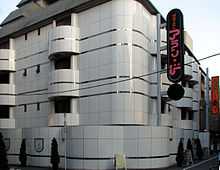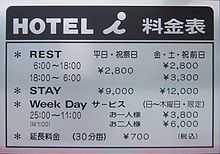Love hotel
A love hotel is a type of short-stay hotel found around the world operated primarily for the purpose of allowing couples privacy for sexual activities. The name originates from "Hotel Love" in Osaka which was built in 1968 and had a rotating sign.[1]
Distinguishing characteristics

Love hotels can usually be identified using symbols such as hearts and the offer of a room rate for a "rest" (休憩 kyūkei) as well as for an overnight stay.[2] The period of a "rest" varies, typically ranging from one to three hours. Cheaper daytime off-peak rates are common. In general, reservations are not possible, and leaving the hotel will forfeit access to the room; overnight-stay rates become available only after 10:00 p.m. These hotels may be used for prostitution, although they are sometimes used by budget-travelers sharing accommodation.


Entrances are discreet; and interaction with staff is minimized. Rooms are often selected from a panel of buttons; and the bill may be settled by pneumatic tube, automatic cash machine, or a pair of hands behind a pane of frosted glass. Although cheaper hotels are often quite sparse, higher-end hotels may feature fanciful rooms decorated with anime characters; and equipped with rotating beds, ceiling mirrors, karaoke machines,[3] and unusual lighting; or may be styled similarly to dungeons or other fantasy scenes, sometimes including S&M gear.[4]
These hotels are typically either concentrated in city districts close to stations, near highways on the city outskirts, or in industrial districts. Love hotel architecture is sometimes garish, with buildings shaped like castles, boats or UFOs and lit with neon lighting.[2] However, some more recent love hotels are very ordinary looking buildings, distinguished mainly by having small, covered, or even no windows.[5]
Around the world
Japan
The history of love hotels (ラブホテル rabu hoteru) can be traced back to the early Edo Period, when establishments appearing to be inns or teahouses with particular procedures for a discreet entry or even with secret tunnels for a discreet exit were built in Edo and in Kyoto.[6] Modern love hotels developed from tea rooms (chaya (茶屋)) used mostly by prostitutes and their clients but also by lovers. After World War II, the term tsurekomi yado (連れ込み宿 lit. "bring-along inn") was adopted, originally for simple lodgings run by families with a few rooms to spare. These establishments appeared first around Ueno, Tokyo in part due to demand from Occupation forces, and boomed after 1958 when legal prostitution was abolished and the trade moved underground. The introduction of the automobile in the 1960s brought with it the "motel" and further spread the concept.
The original term has since fallen into disuse within the industry itself thanks to the euphemism treadmill, and an ever-changing palette of terms is used by hotel operators keen on representing themselves as more fashionable than the competition. Alternative names include "romance hotel", "fashion hotel", "leisure hotel", "amusement hotel", "couples hotel", and "boutique hotel".[5]
South Korea
Love hotels (Korean: 러브호텔), also known as love motels,[7] first appeared in South Korea in the mid-1980s. They were originally called "Parktel" (Korean: 박텔). Their boom and growth was originally attributed to the 1988 Olympics which took place in Seoul.[8] The hotels have historically been seen as seedy, with some residents speaking out against them and not wanting them within certain distances of schools and residential areas.[9][10] However, some hotel owners have tried to remove that element from their business by upgrading, offering cleaner modern services, and removing some of the more sexual elements from their decor.[8] They are considered a taboo topic in South Korea and a photo exhibit of love motels taken by a foreigner created a controversy in 2010.[11]
Thailand
Thailand has had love motels since 1935 and there are approximately 100 establishments in Bangkok most densely located around Ratchadaphisek Road. The government no longer issues building permits for these types of motels, but some businesses work around the laws. In addition to short-stay, the motels are also used by, and recommended to, foreign travellers on a budget.[12]
Other countries
Similar establishments also exist in other East Asian countries and regions such as Singapore,[13][14] Taiwan and Hong Kong.

The same concept also exists in Central and South America. In Guatemala, they are called "autohotels";[15] in Chile "motel" or "hotel parejero" (couples' hotel); in the Dominican Republic, "cabañas", "moteles" or "estaderos"); in Argentina and Uruguay, "albergue transitorio" or more informally, "telo";"motel" in Mexico, Brazil, Colombia and Puerto Rico, they are simply called "motels" (the word is exclusively used for love hotels).
In Nigeria, love hotels are called "short-time". They are often dingy accommodations in densely populated areas with some hotels offering"short-time" services under the counter.
In the United States and Canada, certain motels in low-income areas often serve similar functions as a Japanese love hotel. Colloquially known as "No-Tell Motels," these are becoming scarce as local laws increasingly require renters' identification information to be recorded and given to law enforcement agencies.
In Oceania, New Zealand opened its first love hotel in May 2011,[16] and Australia opened its first love hotel in August 2011.[17]
Economic aspects
The annual revenue of the love hotel industry in Japan is estimated at more than $40 billion,[18] a figure double that of Japan's anime market.
It is estimated that more than 500 million visits to Japan's 37,000[19] love hotels take place each year, which is the equivalent of around 1.4 million couples,[19] or 2% of Japan's population, visiting a love hotel each day.[5] In recent years, the love hotel business has drawn the interest of the structured finance industry.[19]
Several transactions have been completed where the cash flows from a number of such hotels have been securitised and sold to international investors and buy-out funds.[3][20]
See also
References
- ↑ Slavin, Erik (25 March 2007). "My months in a love hotel". Stars and Stripes. Retrieved 27 June 2011.
- ↑ 2.0 2.1 Basil, Michael (June 2007). "Japanese love hotels: A photo essay". Consumption, Markets, and Culture 10 (2): 203–221. doi:10.1080/10253860701256315.
- ↑ 3.0 3.1 Wakao, Aiko (9 June 2007). "Developing a passion for love hotels". New Zealand Herald. Retrieved 23 January 2008.
- ↑ Haggart, Blayne (16 October 2002). "A night in a Japanese love hotel". The Globe and Mail (Toronto). Retrieved 23 January 2008.
- ↑ 5.0 5.1 5.2 Chaplin, Sarah (2007). Japanese Love Hotels: A Cultural History. London: Routledge. p. 149. ISBN 0-415-41585-3, ISBN 0-415-48754-4.
- ↑ Ihara, Saikaku (1964). The Life of an Amorous Man. Translated by Kengi Hamada. Rutland, Vermont: Charles E. Tuttle Company. pp. 113–114. ISBN 0-8048-1069-9.
- ↑ Enrique Zaldua (28 June 2002). "World Cup: Why Some Teams Just Can't Win". Time. Retrieved 27 June 2011.
- ↑ 8.0 8.1 Choi Min-woo; Nam Koong-wook (18 May 2005). "Love hotels not just for secret liaisons anymore". JoongAng Daily. Archived from the original on 19 May 2005. Retrieved 24 April 2009.
- ↑ Choi Joon-ho (19 August 2002). "'Love hotel' label roils residents". JoongAng Daily. Retrieved 27 June 2011.
- ↑ Jeon Ik-jin (5 October 2000). "Anti-Love Hotel Campaign Spreads All Over the Country". JoongAng Daily. Retrieved 27 June 2011.
- ↑ Kim Seong-kon (30 March 2010). "What are we trying to hide in this era?". The Korea Herald. Retrieved 27 June 2011.
- ↑ Wechsler, Maxmilian (2 May 2010). "The seedy side of Bangkok's love motels". Bangkok Post. Retrieved 27 June 2011.
- ↑ "The Insider: Love hotels". Time Out Singapore. 19 January 2009. Retrieved 5 December 2011.
- ↑ Richie, Donald (26 August 2007). "It's ladies first now in Japanese love hotels". The Japan Times. Retrieved 5 December 2011. Review of Japanese Love Hotels: A Cultural History.
- ↑ Greenspan, Eliot (2007). "Guatemala: Tips on Accommodations". Frommer's Guatemala (1st ed.). Frommer's. ISBN 978-0-470-04730-9.
- ↑ "NZ's first love motel set to open doors". TVNZ. 11 May 2011. Retrieved 27 June 2011.
- ↑ "Love shack where mini-breaks last just an hour". SMH. 13 August 2011. Retrieved 10 January 2014.
- ↑ Neill, Morgan (2 July 2009). "Love hotel business zooms despite downturn". CNN. Retrieved May 13, 2014.
- ↑ 19.0 19.1 19.2 Kelly, Tim (6 May 2006). "Love for Sale". Forbes. Retrieved 15 June 2007.
- ↑ Schreiber, Mark (18 July 2004). "'Love hotels' juggle bedsheets and balance sheets". The Japan Times. Retrieved 16 February 2007.
Further reading
- Bornoff, Nicholas (1991). Pink Samurai: Love, Marriage, and Sex in Contemporary Japan. New York: Pocket Books. ISBN 0-671-74265-5. OCLC 0671742655.
- Constantine, Peter (1993). Japan's Sex Trade: A Journey Through Japan's Erotic Subcultures. Tokyo: Yenbooks. ISBN 4-900737-00-3. OCLC 37135004.
- De Mente, Boye Lafayette (2006). Sex and the Japanese: The Sensual Side of Japan. Rutland, Vermont: Tuttle Publishing. ISBN 0-8048-3826-7. OCLC 71239207.
- Jacob, Ed (2008). Love Hotels: An Inside Look at Japan's Sexual Playgrounds. Raleigh, N.C.: Lulu Press. ISBN 978-1-4357-4186-7. OCLC 317291464.
- Keasler, Misty (photographer); Rod Slemmons (essay) (2006). Love Hotels: The Hidden Fantasy Rooms of Japan. Foreword by Natsuo Kirino. San Francisco: Chronicle Books. ISBN 0-8118-5641-0. OCLC 65197752.
- Payne, Peter (4 April 2013). "Love Hotels in Japan: Q&A". J-List Side Blog.
- Takahara, Kanako (16 October 2007). "No-tell love hotels cash in catering to the carnal". The Japan Times. FYI (weekly column).
- Tsuzuki, Kyoichi, ed. (2008). ラブホテル—Satellite of LOVE [Love Hotel: Satellite of Love] (in Japanese and English). Trans. by Alfred Birnbaum (revised ed.). Tokyo: Aspect. ISBN 4-7572-1490-1. OCLC 228498562. A photobook on the subject.
External links
| Wikimedia Commons has media related to Love hotels. |
- www.mistykeasler.com—Photographs of Japanese love hotels by photographer Misty Keasler, who published a book on the subject (see the Further reading section above)
